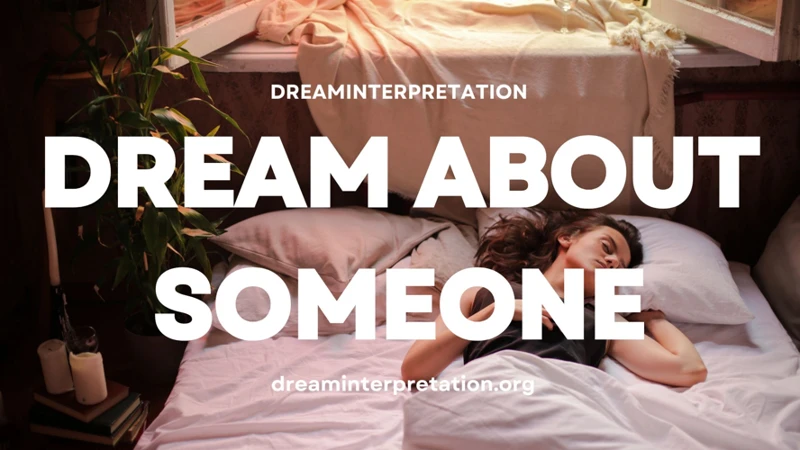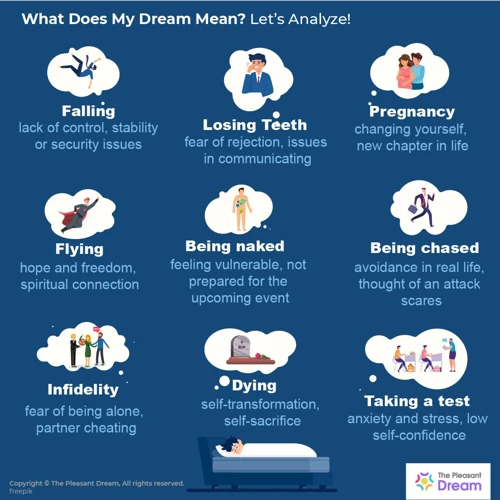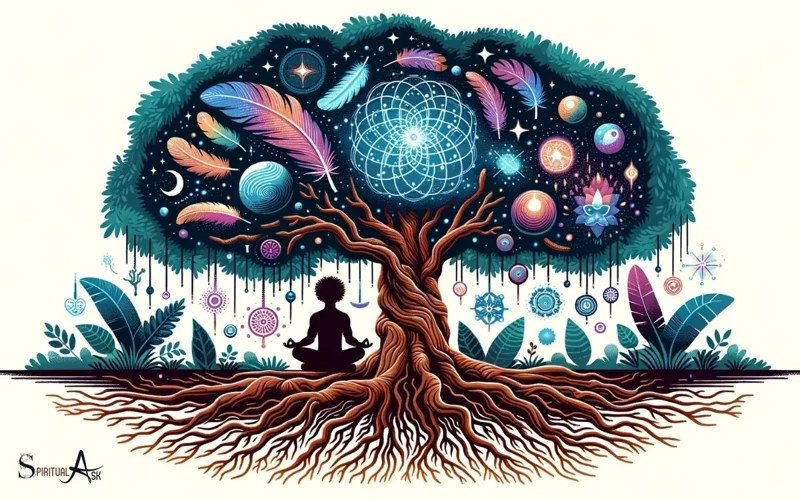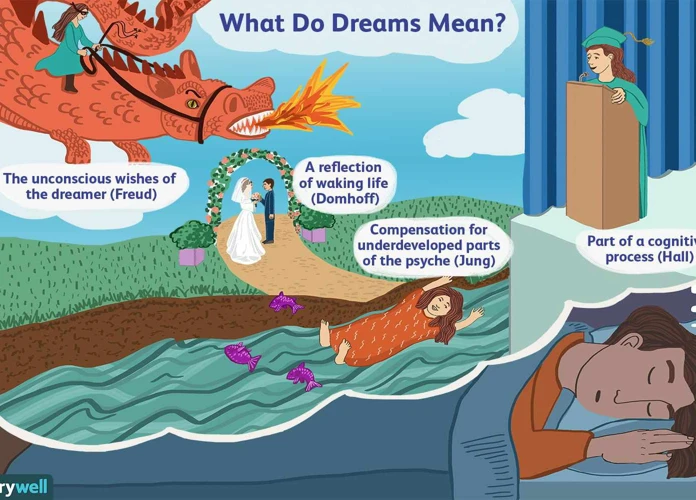Have you ever had a dream about someone and wondered if it meant something more? Dreams have always fascinated humankind, and we have long sought to uncover the secrets and meanings behind them. In this article, we delve into the intriguing realm of dream interpretations, specifically focusing on the phenomenon of dreaming about someone and exploring the potential connections and implications. From the scientific explanations behind dreams to common beliefs and personal experiences, we explore the various perspectives on the significance of dreaming about someone. Join us on this mysterious journey as we unravel the enigmatic nature of dreams and delve into the possibility of a deeper connection between our dreams and the thoughts of others.
The Science of Dreams

The Science of Dreams is a fascinating field that delves into the intricate workings of our subconscious mind during sleep. Dreams serve a variety of purposes, ranging from processing emotions and memories to problem-solving and creativity stimulation. According to scientific research, dreams are formed through a complex interplay of different brain regions and neurotransmitters. The activation-synthesis theory suggests that dreams are a result of the brain’s attempt to make sense of random neural activity during REM sleep. On the other hand, the psychoanalytic perspective by Sigmund Freud emphasizes the role of the unconscious mind in shaping dreams and revealing hidden desires. Regardless of the exact mechanisms, dreams provide a window into our inner thoughts and emotions, allowing us to delve into the hidden depths of our consciousness.
1. The Purpose of Dreams
The purpose of dreams is a topic that has intrigued scientists, psychologists, and philosophers for centuries. While the exact function of dreams is not fully understood, various theories have emerged to explain their significance. One theory suggests that dreams serve as a way for the brain to process and consolidate emotions, memories, and experiences from the day. This processing can aid in problem-solving, learning, and emotional regulation. Another perspective posits that dreams act as a form of wish fulfillment, allowing individuals to fulfill their unconscious desires and fantasies. Additionally, dreams may help us gain insight into ourselves and our deepest desires, providing a symbolic representation of our subconscious thoughts. Understanding the purpose of dreams can offer valuable insights into our inner world and lead to personal growth and self-reflection.
2. How Dreams Are Formed
Dreams are formed through a complex interplay of different brain regions and neurotransmitters. During REM (rapid eye movement) sleep, the brain becomes highly active, and dreams occur. The activation-synthesis theory suggests that dreams are a result of the brain’s attempt to make sense of random neural activity during this stage. According to this theory, the brain generates images, sensations, and emotions in an effort to create a narrative from the chaotic signals received. This narrative is influenced by a combination of personal experiences, memories, and emotions. While dreams may not always make logical sense, they provide valuable insights into our subconscious mind and can offer clues to our emotions, desires, and fears. Understanding how dreams are formed can shed light on the complex and mysterious nature of our nighttime adventures.
3. The Role of Subconscious Mind
The subconscious mind plays a crucial role in shaping our dreams and the meanings they hold. It is the deeper, hidden part of our consciousness where thoughts, emotions, desires, and memories reside. During sleep, our subconscious mind becomes more active, allowing it to express itself more freely through dreams. It is believed that dreams provide a way for the subconscious mind to process unresolved issues, emotions, and experiences, often symbolically. By analyzing the symbolism and themes in our dreams, we can gain insights into our innermost thoughts and feelings. The subconscious mind may also use dreams as a means of communicating important messages and guidance to the conscious mind. Understanding the role of the subconscious mind can help us unravel the significance and interpretations behind our dreams.
Dreaming of Someone: Is it a Sign?

Dreaming of someone can be a perplexing experience, leaving us wondering if there is a deeper meaning behind it. While there is no definitive answer, exploring common beliefs, personal experiences, and even psychic perspectives can shed light on the possible significance of dreaming about someone. Many people believe that dreaming about someone may indicate a connection or an unresolved issue between the dreamer and the person in question. Some interpret it as a sign of longing, desire, or even a subconscious message from the other person. However, it is essential to note that dream interpretation is subjective, and the true meaning can vary depending on the individual and the circumstances surrounding the dream. Ultimately, only the dreamer can truly determine if their dream holds any significance and what it might represent.
1. Exploring the Common Beliefs
Exploring the Common Beliefs: When it comes to dreaming about someone, there are several common beliefs that people hold. One belief is that dreaming about someone means they are thinking about you. This idea suggests a mystical or telepathic connection between individuals. Another belief is that dreaming about someone signifies unresolved feelings or unfinished business with that person. It could indicate a desire for closure or the need to address past issues. Additionally, some believe that dreaming about a deceased loved one is a way for their spirit to communicate with us from the other side. These common beliefs highlight the intricate and often mystical interpretations we attribute to our dreams. While science may not provide concrete answers to these beliefs, they serve as a testament to the profound impact dreams can have on our lives.
2. Analyzing Personal Experiences
– Reflect on your personal experiences and relationships with the person you dreamt about. Consider the nature of your connection, the emotions involved, and any recent interactions you may have had. Pay attention to the feelings that arise when you think about the dream and the person in question. Your subconscious mind may be drawing on your memories and emotions to create dream scenarios that hold personal significance. Keep in mind that dreams are highly individual and can be influenced by our unique experiences. Keeping a dream journal can help you identify patterns and gain insight into your dreams. Additionally, seeking the guidance of a professional dream analyst or therapist may provide valuable insights into the meaning behind your dreams. Remember, analyzing personal experiences is a crucial step in deciphering the potential significance of dreaming about someone.
3. The Psychic Perspective
– When it comes to the phenomenon of dreaming about someone, some people turn to psychic perspectives for insights. Psychic beliefs suggest that dreams can provide glimpses into the thoughts and energies of the person you are dreaming about. Psychics believe that dreams can be a form of communication from the spiritual realm and may indicate a connection or message from the person in question. These interpretations often involve elements of intuition and psychic abilities, such as clairvoyance or telepathy. While the psychic perspective may not have scientific evidence to support its claims, it offers an alternative lens through which to explore the meaning behind dreaming of someone. Whether you seek guidance from a psychic or approach it with a healthy dose of skepticism, considering the psychic perspective can add an intriguing layer to your exploration of dream interpretations.
Interpreting Dream Meanings

Interpreting Dream Meanings is a captivating endeavor that involves deciphering the hidden messages and symbols within our dreams. Understanding the symbols and themes present in our dreams is crucial for unraveling their meanings. Dream symbols can vary widely, ranging from common objects and animals to more abstract concepts, and their interpretations may differ based on personal experiences and cultural influences. Another aspect to consider when interpreting dream meanings is the analysis of the emotions involved. Emotions experienced during a dream can provide valuable insights into our deepest desires, fears, and unresolved conflicts. Additionally, considering personal connections to the people, places, or events depicted in the dream can offer further clarity. By delving into the symbolism, emotions, and personal connections within our dreams, we can unlock the secret messages they may hold and gain a deeper understanding of our subconscious thoughts and desires.
1. Understanding Symbols and Themes
Understanding symbols and themes is a crucial aspect of dream interpretation. When analyzing dreams, it is important to recognize that many elements within the dream may carry symbolic meaning. For example, seeing water in a dream could represent emotions or a journey. Animals, objects, or people in dreams may also have symbolic significance based on cultural or personal associations. Interpreting symbols requires a combination of intuition, personal experiences, and research into common dream symbolism. By unraveling the hidden meanings behind these symbols and identifying recurring themes in our dreams, we can gain insights into our subconscious mind and the messages it may be trying to convey. To delve deeper into dream interpretations, check out our article on the meaning behind dreaming about a cheating wife.
2. Analyzing the Emotions Involved
When analyzing the emotions involved in our dreams, we can gain valuable insights into their meanings. The emotions we experience during a dream can serve as important clues and can help us understand the underlying messages or symbols. For example, if we feel joy or excitement in a dream, it could indicate positive emotions or a sense of fulfillment. Conversely, if we feel fear or anxiety, it might suggest unresolved fears or worries in our waking life that need attention. By paying close attention to the emotions evoked in our dreams, we can unravel the deeper significance they hold and gain a better understanding of our subconscious thoughts and desires. If you’re curious about why you may have dreamed about your crush liking you back, you can explore our article on that topic.
3. Considering Personal Connections
When considering personal connections in dream interpretation, it is important to reflect on the relationships and emotions tied to the person you dreamt about. Ask yourself: How do you feel about this person? Are there any unresolved issues or unexpressed feelings between you? Your dream may be reflecting these hidden emotions or desires. Additionally, the dream may symbolize certain qualities or traits associated with the person, and exploring how these qualities relate to your current life circumstances can provide valuable insights. By delving into the personal connections in your dreams, you can uncover deeper meanings and gain a better understanding of yourself and your relationships.
The Possible Connection Between Dreams and Thoughts

The Possible Connection Between Dreams and Thoughts is a subject that has intrigued philosophers, psychologists, and spiritualists alike. Some believe that dreams can be influenced by the energy of our thoughts and intentions, manifesting in our subconscious mind during sleep. The power of thought energy is thought to extend beyond the waking state, potentially affecting our dream experiences as well. Additionally, emotional bonds with others can play a role in our dream connections, as dreams may reflect our deep-seated feelings and desires towards specific individuals. From a spiritual perspective, dreams can be seen as a reflection of the collective consciousness, tapping into a realm beyond personal thoughts and experiences. While the exact nature of the connection between dreams and thoughts remains a mystery, it is clear that our mental and emotional states can influence the content and symbolism of our dreams, leading to a deeper exploration of the human mind and its capacity for connection and expression.
1. Exploring the Power of Thought Energy
– Thoughts and emotions are powerful forces that can shape our reality and influence the world around us. Exploring the power of thought energy leads us to the concept that our thoughts have the ability to manifest and attract certain outcomes, including the potential connection between dreams and thoughts. Some believe that when we dream of someone, it may be a reflection of their thoughts about us or a result of our own thoughts and desires projecting onto them. The idea behind thought energy is that our focused intention and emotions can create energetic vibrations that extend beyond our physical bodies, potentially reaching others on a subconscious level. This concept opens up the possibility that the dreams we have about someone may be a result of the energetic exchange between our thoughts and their consciousness. While this theory remains speculative, it invites us to consider the profound influence our thoughts can have on our dream experiences and connections with others.
2. The Influence of Emotional Bonds
Emotional bonds play a significant role in the influence dreams have on our thoughts and experiences. When we have a strong emotional connection with someone, such as a romantic partner, family member, or close friend, it is natural for them to appear frequently in our dreams. These emotional bonds create a subconscious desire for connection and can manifest in dreams as a way to process and explore our feelings. Dreams about someone we have emotional ties to can evoke intense emotions and reflect the depth of our relationships. They may provide insights into our desires, unresolved issues, or the need for communication and understanding. Exploring the influence of emotional bonds in dreams allows us to delve deeper into our connections with others and gain a better understanding of our own emotional landscape.
3. Spirituality and Collective Consciousness
Spirituality and collective consciousness are areas of interest when exploring the possible connection between dreams and thoughts. Some individuals believe that dreams can act as a conduit for spiritual experiences and insights from the collective unconscious. They argue that dreams can tap into a shared pool of knowledge, archetypes, and symbolism that is present across cultures and time periods. Additionally, proponents of this perspective suggest that dreams may offer glimpses into past lives or connect us with a higher power or cosmic energy. While scientific evidence may be limited in this realm, the exploration of spirituality and collective consciousness adds another layer of intrigue to the mysteries of dreams and their potential connection to the thoughts and experiences of others.
How to Strengthen Your Dream Connections
Strengthening your dream connections can be an exciting journey of self-discovery and spiritual growth. One effective way to enhance your dream connections is by keeping a dream journal. This involves recording your dreams immediately upon waking up, allowing you to capture the vivid details and emotions before they fade away. Another powerful technique is the practice of meditation and visualization. By quieting the mind and focusing your intention on connecting with your dreams, you can deepen your awareness and increase the clarity of your dream experiences. Additionally, cultivating positive energy and intentions in your waking life can have a positive impact on your dream connections. Surrounding yourself with uplifting and supportive influences, practicing gratitude, and setting positive intentions before sleep can create a conducive environment for meaningful dream experiences. Embracing these practices can help you unlock the hidden potential of your dreams and foster a stronger connection between your conscious and subconscious mind.
1. Keeping a Dream Journal
Keeping a Dream Journal is a valuable practice for exploring the depths of your dreams and gaining insight into their meanings. By recording your dreams in a journal, you can capture important details, themes, and emotions that may fade from memory upon waking. A dream journal can be as simple as a notebook by your bed or a digital journal on your phone or computer. Make it a habit to write down your dreams as soon as you wake up, before they slip away. Include any vivid images, conversations, and emotions you experienced. Over time, patterns may emerge, allowing you to identify recurring symbols or themes. Reviewing your dream journal regularly can help you uncover hidden messages and gain a deeper understanding of your subconscious mind.
2. Practicing Meditation and Visualization
Meditation and visualization techniques can be powerful tools for strengthening connections within your dreams. By incorporating regular meditation practices into your daily routine, you can enhance your ability to recall dreams and cultivate a deeper awareness of your subconscious mind. During meditation, focus on setting intentions for your dreams, such as connecting with a specific person or receiving guidance. Additionally, visualization exercises before sleep can help you create a clear image or scenario of the person you wish to dream about. By engaging in these practices, you can create a conducive environment for strengthening your dream connections and potentially experiencing profound experiences within your dream realm.
3. Cultivating Positive Energy and Intentions
When it comes to cultivating positive energy and intentions in order to strengthen your dream connections, there are several practices you can incorporate into your daily routine.
– Mindfulness meditation: Engage in regular mindfulness meditation to increase self-awareness and promote a positive mindset. This can help create a conducive environment for meaningful and positive dream experiences.
– Visualization: Practice visualizing positive outcomes and interactions with the person you dream about. By visualizing positive scenarios before falling asleep, you can influence the content of your dreams and manifest more positive connections.
– Affirmations: Use positive affirmations related to your dream connections to reinforce your intentions and set a positive tone before bed. Repeat affirmations such as “I am open to positive connections in my dreams,” or “I am deserving of meaningful dream experiences.”
– Gratitude: Cultivate a sense of gratitude for the person you dream about and the connections you share. Expressing gratitude before sleep can invite more positive experiences and strengthen your bond in the dream realm.
– Journaling: Keep a dream journal to record your dreams and track any patterns or themes related to the person you dream about. This helps you become more attuned to your dream experiences and allows you to explore any possible messages or insights.
Conclusion
In conclusion, the world of dreams is a captivating realm that holds countless secrets and meanings. Whether we dream of someone or are trying to interpret the symbols and themes within our dreams, the connections between dreams and thoughts remain enigmatic. From considering the scientific explanations behind dreams to exploring personal experiences and beliefs, we have touched upon various aspects of dream interpretations. While there may not be a definitive answer to the question of whether someone is thinking about us when we dream of them, the exploration of dreams can provide valuable insights into our subconscious mind and our emotional connections. By keeping dream journals, practicing meditation, and cultivating positive energy, we can strengthen our dream connections and enhance our understanding of the hidden realms of our consciousness. Remember, dreams are a reflection of our thoughts, emotions, and experiences, and through them, we can gain a deeper understanding of ourselves and the world around us.
Frequently Asked Questions
1. What is the purpose of dreaming?
The purpose of dreaming is still a topic of debate among scientists and psychologists. While some theories suggest that dreams serve an evolutionary function, helping us process emotions and memories, others propose that dreams are simply a byproduct of brain activity during sleep.
2. Why do we sometimes dream about specific people?
Dreaming about specific people can have various interpretations. It could be a reflection of our emotions, desires, or unresolved issues related to that person. It can also be influenced by recent experiences or memories involving them.
3. Can dreams predict the future?
There is no scientific evidence to support the claim that dreams can predict the future. However, some people believe in the power of precognitive dreams, suggesting that they have had prophetic experiences during sleep.
4. What does it mean if I dream about my partner cheating on me?
Dreams about infidelity can be unsettling, but they do not necessarily indicate that your partner is being unfaithful. Instead, they may reflect insecurities, trust issues, or other relationship concerns that need attention and communication.
5. Are there universal symbols in dream interpretation?
While there are some symbols that are commonly associated with specific meanings, dream interpretation often varies from person to person. Symbols can be influenced by cultural, personal, and individual experiences, making it important to consider personal context when analyzing dream symbolism.
6. How can keeping a dream journal be helpful?
Keeping a dream journal allows you to record and analyze your dreams over time. It helps in identifying patterns, recurring themes, and symbols, which can provide insights into your subconscious mind and aid in personal growth and self-reflection.
7. Can meditation and visualization enhance dream experiences?
Practicing meditation and visualization techniques can enhance dream experiences by improving mindfulness and enhancing self-awareness. These practices can help in developing lucid dreaming skills and exploring the depths of your dreams more intentionally.
8. What role does emotional connection play in dream interactions?
The emotional connection we have with someone can influence our dreams about them. Strong emotional bonds, whether positive or negative, can manifest in vivid dreams, reflecting the intensity of the feelings involved.
9. Is there a spiritual or metaphysical aspect to dream connection?
Some believe that dream connections can extend beyond the physical realm and tap into spiritual or metaphysical dimensions. This perspective suggests that dreams can provide glimpses into collective consciousness or serve as a medium for communication with higher realms.
10. Can interpreting dreams help in understanding ourselves better?
Yes, interpreting dreams can help in understanding ourselves better by providing insights into our subconscious thoughts, emotions, and fears. It can illuminate hidden desires, unresolved issues, and areas for personal growth and self-reflection.







